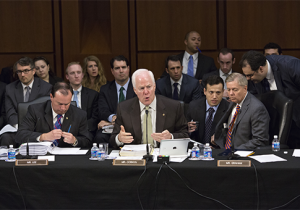Dear Committee on the Judiciary, U.S. Senate,
I’ve read your letter to Senate Majority Leader McConnell stating your intention to block any vote on a nominee for the Supreme Court until next year.  Senator McConnell said (long before Merritt Garland was even nominated) he would not even meet with a nominee. You and your fellow Republicans refer to this commitment as an “exercise of constitutional power” designed to “protect the will of the American people.”
Senator McConnell said (long before Merritt Garland was even nominated) he would not even meet with a nominee. You and your fellow Republicans refer to this commitment as an “exercise of constitutional power” designed to “protect the will of the American people.”
There is a fundamental problem with your logic:
since the American people elected President Obama twice by wide margins knowing at the time there was a high probability there would be some Supreme Court appointments during his terms, then please understand that the majority of “the American people” already have made our will perfectly clear: we want President Obama to choose the next justice for the Supreme Court.
The American people want you and other Senators to receive the President’s nominee respectfully. We want you to offer fair hearings. We want to you allow the “full and robust debate” that this constitutional process is designed to produce. We want you to advise and consent based on the merits of the nominee, not on your particular pet ideologies. THIS is the “constitutional power” entrusted to you.
Our Founders created this impressive document in the midst of great debate and diversity.  It represents a commitment to the principles of compromise and collaboration. It models a wise, ongoing approach of respectful negotiation between strong differences of opinion. Its spirit of e pluribus unum sets the stage well for our life together as an increasingly diverse community.
It represents a commitment to the principles of compromise and collaboration. It models a wise, ongoing approach of respectful negotiation between strong differences of opinion. Its spirit of e pluribus unum sets the stage well for our life together as an increasingly diverse community.
Claiming “constitutional authority” to obstruct the constitutional process of “advice and consent” dishonors the very Constitution you purport to serve.
It is “the will of the American people” that you respect the Constitution and do your job. Protect that.
Respectfully yours,
Rev. Charlotte Vaughan Coyle
Here is a link to the Senate Judiciary Committee members. You can find contact information for each of the senators from this GovTrack.us website.
https://www.govtrack.us/congress/committees/SSJU
Charlotte Vaughan Coyle lives in Paris TX and blogs about intersections of faith, culture and politics on her website and Intersections Facebook page. She frequently shares her thoughts with Coffee Party USA as a regular volunteer.
shares her thoughts with Coffee Party USA as a regular volunteer.
Charlotte is an ordained minister within the Christian Church (Disciples of Christ) and also blogs about Scripture from a progressive Christian approach in her Living in The Story Musings.
In America, the procedure is to fire employee(s) who does not do their job. Members of Congress are not doing their jobs. We need to fire them, starting with the ones who arrogantly tout not fulfilling their duties. It is our duty as American citizen voters to fire them. The present actions of McConnell and his followers to disgrace the offices of Congress and the President with their disrespect for the law
This letter by the Committee leaves me no choice as an angry registered Republican. I will not vote for any Republican come November. It sickens me to the point of wishing there was some way to hold the Committee legally responsible for their reprehensible inability to govern.
I totally agree, thank you for representing what is, the right thing to do. Our political behavior has become a disgrace to our country. I would think politicians would realize, quite a few people are watching their behavior, and when it’s time for reelections, they will be unemployed.
I strongly believe that the American people have spoken when they twice voted for President Obama. I wonder if the Senate has thought about the potential of the presidential election needing the Supreme Court to make a decision concerning the election similar to Bush/Gore. Or that Secretary Clinton might choose a much more liberal canidate. I agree they are playing with fire. It seems that President Obama went out of his way to find a nominee that was less controversial. Why don’t the Republicans seem to ever work for the people!!
You will be voted out BY THE PEOPLE……I advise you to reconsider. YOU all have been a disgrace to America and the American people. Do your job!!!!
Whomever wrote this letter needs to be fired, because clearly they are not educated on the facts enough todo their job….and their hoping that the American people aren’t either.
FACT: The first nomination during an election year in the twentieth century came on March 13, 1912, when President William Taft (a Republican) nominated Mahlon Pitney to succeed John Marshall Harlan, who died on October 14, 1911. The Republican-controlled Senate confirmed Pitney on March 18, 1912, by a vote of fifty to twenty-six.
President Woodrow Wilson (a Democrat) made two nominations during 1916. On January 28, 1916, Wilson nominated Louis Brandeis to replace Joseph Rucker Lamar, who died on January 2, 1916; the Democratic-controlled Senate confirmed Brandeis on June 1, 1916, by a vote of forty-seven to twenty-two. Charles Evans Hughes resigned from the Court on June 10, 1916 to run (unsuccessfully) for president as a Republican. On July 14, 1916, Wilson nominated John Clarke to replace him; Clarke was confirmed unanimously ten days later.
On February 15, 1932, President Herbert Hoover (a Republican) nominated Benjamin Cardozo to succeed Oliver Wendell Holmes, who retired on January 12, 1932. A Republican-controlled Senate confirmed Cardozo by a unanimous voice vote on February 24, 1932.
On January 4, 1940, President Franklin Roosevelt (a Democrat) nominated Frank Murphy to replace Pierce Butler, who died on November 16, 1939; Murphy was confirmed by a heavily Democratic Senate on January 16, 1940, by a voice vote.
On November 30, 1987, President Ronald Reagan (a Republican) nominated Justice Anthony Kennedy to fill the vacancy created by the retirement of Louis Powell. A Democratic-controlled Senate confirmed Kennedy (who followed Robert Bork and Douglas Ginsburg as nominees for that slot) on February 3, 1988, by a vote of ninety-seven to zero.
In two instances in the twentieth century, presidents were not able to nominate and confirm a successor during an election year. But neither reflects a practice of leaving a seat open on the Supreme Court until after the election.
On September 7, 1956, Sherman Minton announced his intent to retire in a letter to President Dwight D. Eisenhower, and he served until October 15, 1956. With the Senate already adjourned, Eisenhower made a recess appointment of William J. Brennan to the Court shortly thereafter; Brennan was formally nominated to the Court and confirmed in 1957. The fact that Eisenhower put Brennan on the Court is inconsistent with any tradition of leaving a seat vacant.
And in 1968, President Lyndon B. Johnson nominated Abe Fortas, who was already sitting as an Associate Justice, to succeed Chief Justice Earl Warren, but the Fortas nomination was the target of a bipartisan filibuster – principally in reaction to the Warren Court’s liberalism and ethical questions about Fortas, although objections were certainly also made that it was inappropriate to fill the seat in an election year. That filibuster prompted Homer Thornberry, whom Johnson nominated to succeed Fortas as an Associate Justice, to withdraw his name from consideration in October 1968, because there was no vacancy to fill. Moreover, the failure to confirm Fortas as the Chief Justice did not leave the Court short a Justice, because Chief Justice Earl Warren remained on the bench.
Does two or three or… fifteen wrongs make it right NOW?
I think it is quite a gamble on the part of the Republican party. Since the odds are that Trump will never be president, it will leave the decision up to probably Hilary Clinton. How will that advance their agenda?
The Constitution does not give a time frame in which Congress must hold the review for acceptance/refusal. (In effect, Congress could hold the action in abeyance until after the current holder leaves office. The delay of action in selection of nominees has been done by both Parties; it is NEITHER unlawful, NOR is it unprecedented, only the time span is a bit longer. Part of the “Checks and Balance” system in action, nothing illegal happening, just poor choice of wording. (It just saves time, argument, and money.)
There is no time frame? It isn’t illegal? This is your argument?